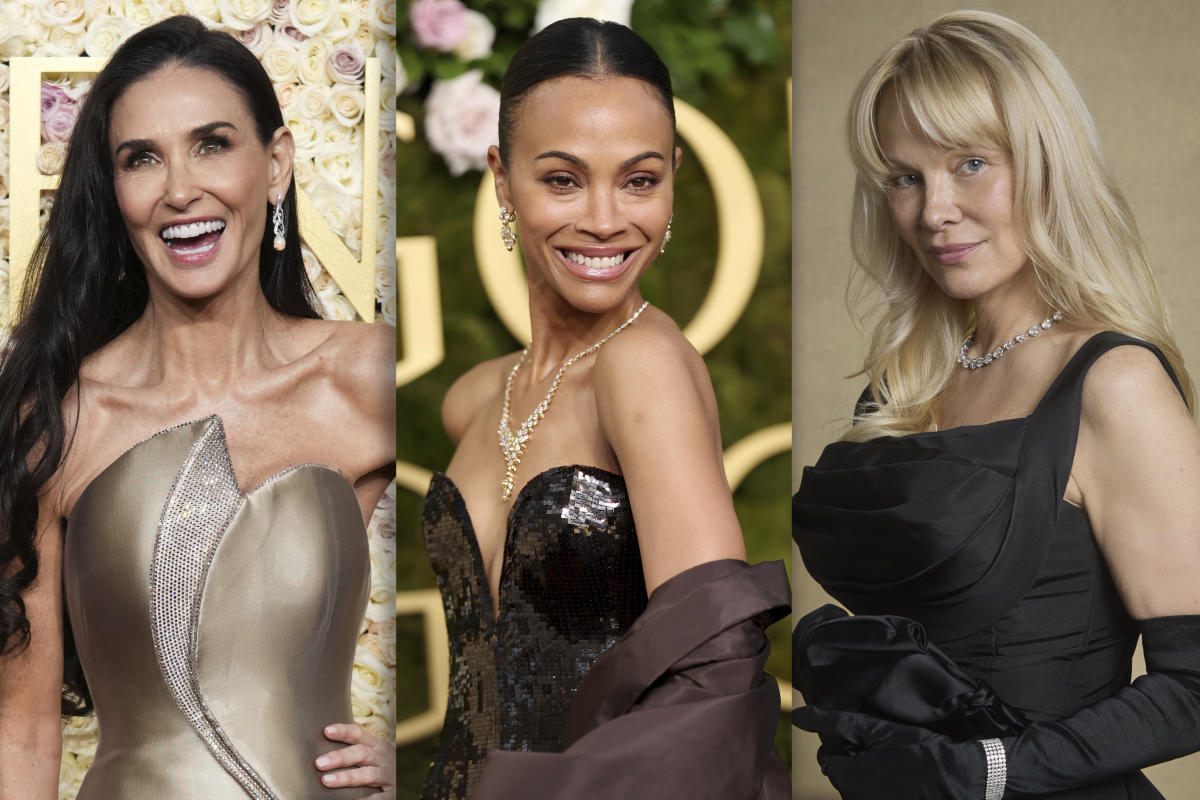Women in Hollywood who had moved out of the spotlight — or perhaps had the spotlight moved away from them — are once again ready for their close-ups.
At the Golden Globe Awards on Jan. 5, the actresses Demi Moore and Zoe Saldaña took the stage to accept awards for their work in The Substance and Emilia Pérez, respectively — two films that place women over 40 firmly front and center.
Both took their moments, whether onstage or backstage, to open up about how they had almost called it quits on the entertainment industry.
Advertisement
Advertisement
“I thought a few years ago that maybe this was it,” Moore, 62, said in an emotional acceptance speech after her upset win for Best Performance by a Female Actor in a Motion Picture — Musical or Comedy. “Maybe I was complete. Maybe I’ve done what I was supposed to do.”
“Thirty years ago, I had a producer tell me I was a ‘popcorn’ actress, and at that time, I made that mean that this wasn’t something I was allowed to have,” she said. “That I could do movies that were successful, that made a lot of money, but that I couldn’t be acknowledged. And I bought in and I believed that.”
Moore isn’t the first actress to speak up this awards season about the fear of saying goodbye to a career that has lasted decades — in a film about an aging celebrity who goes to horrific lengths to cling to youth.
Her character is told by an executive named, ahem, Harvey (played by Dennis Quaid) that “people always ask for something new. It’s inevitable. At 50, well, it stops.”
Advertisement
Advertisement
Saldaña and Pamela Anderson, a Golden Globe nominee for The Last Showgirl, also said they had considered moving on from their career before flipping the script and reclaiming their power onscreen.
“I’m 46,” Saldaña said backstage at the awards show. “There is a moment a couple of years ago, where I was sort of thinking about plan Bs. Do I go into a homestead and start planning a garden and baking goods and just become, you know, the sexiest soccer mom, in my mind?”
Anderson spoke about her own journey back to show business after abandoning Hollywood for her home on Vancouver Island.
“I went home to remember who I was,” the Canadian actress, 57, told Mikey Madison, a fellow Golden Globe nominee and star ofAnora, in an interview for Variety. “That’s when I started taking the makeup off and getting my hands dirty.”
Advertisement
Advertisement
More in Entertainment
Anderson, nominated for her role as an aging dancer whose Las Vegas show is being replaced, attended the Globes makeup-free — without help from a stylist or “glam team.”
Hollywood is notoriously fickle and ageist. A decline in a star’s career can be due to any number of factors, including poor box office numbers, but age arguably plays a greater role in sidelining women.
The #MeToo and #TimesUp movements in 2017 opened up the conversation about age, gender and race in Hollywood. But as Claire Sisco King, associate professor of communication studies and chair of the cinema and media arts department at Vanderbilt University, told Yahoo Entertainment: “There’s just something quite explicit about these three women at this moment and the way that they’re taking on the subject of beauty and gender and industry expectations.”
That said, King added, “It’s not the first time that we’ve had that kind of visibility” on the issue.
Advertisement
Advertisement
Take Sunset Boulevard, the quintessential film about an aging silent movie star, who is informed by an equally aging studio boss that she is past her prime. Gloria Swanson, who played Norma Desmond, the star hiding away in her decaying mansion, was 51 when the movie premiered in 1950.
Nicole Kidman, 57, who has practically created her own genre in the last couple of years, was praised for her honesty about the industry when she accepted her first Screen Actors Guild award in 2018 for her work on the HBO series Big Little Lies.
“I want to thank you all for your trailblazing performances you’ve given over your career and how wonderful it is that our careers can go beyond 40 years old. Because 20 years ago, we were pretty washed up by this stage in our lives,” Kidman said, referring to her fellow female co-stars and nominees. “We’ve proven — and these actresses and so many more have proven — we are potent and powerful and viable.”
King said it’s important to consider “who’s making choices about which films get greenlit, which scripts get play” and who is casting the roles.
Advertisement
Advertisement
Both Anderson and Moore credit their female directors (rare in Hollywood, as Golden Globes host Nikki Glaser quipped in her opening monologue) for bringing them back in front of the camera — and, by extension, in line for the awards.
“I didn’t really have representation at the time, but Gia [Coppola] tried to find me through an old agent, and he passed on the movie,” Anderson explained to Madison in their conversation, explaining that she was in her garden making pickles when she first read the script. “Gia didn’t take no for an answer; she found my son Brandon, and Brandon brought me the script, and I read it on my little vegetable farm.”
Moore wasn’t expecting a Golden Globe-winning role herself when the script by Coralie Fargeat, the film’s writer and director, arrived.
“As I was at kind of a low point, I had this magical, bold, courageous, out-of-the-box, absolutely bonkers script come across my desk called The Substance,” Moore said on accepting her award. “And the universe told me that you’re not done. And I am so grateful to Coralie for trusting me to step in and play this woman.”
Advertisement
Advertisement
Fargeat’s script won best screenplay at the 2024 Cannes Film Festival, and she was also nominated for two Golden Globes in the directing and script categories.
“There are more women directors, producers and writers who are willing and able to present middle-aged and older women as we are,” Vicki Larson, author of Not Too Old for That: How Women Are Changing the Story of Aging, told Yahoo Entertainment. “Not just the sweet old ladies, lovable but doddering grandmas, lonely cat ladies or bitter post-menopausal women troupes of the past.”
Saldaña praised the director of Emilia Pérez, Jacques Audiard, for taking a chance on her. “I’m indebted to filmmakers like Jacques Audiard that after conversations and auditions and promises that I can do something, they really decide to bet on me. And it works,” she said backstage at the Golden Globes.
Both Moore and Saldaña said that recognition from filmmakers helps drive their creativity and, as Saldaña put it, “nourishes my desire to continue growing as an artist.”
Advertisement
Advertisement
Closing out her acceptance speech, Moore said she celebrates her award as a “marker” for the “gift of doing something I love and being reminded that I do belong.”
That’s a sentiment that has found its way into several films starring women who connected on a deeper level with the fading characters they brought to life onscreen.
“Feeling seen, feeling beautiful,” Anderson’s Last Showgirl character, Shelly, says in the film. “That is powerful.”
EMEA Tribune is not involved in this news article, it is taken from our partners and or from the News Agencies. Copyright and Credit go to the News Agencies, email news@emeatribune.com Follow our WhatsApp verified Channel




